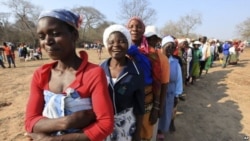A recent research shows that Zimbabwe has not been adequately responding to rural-urban migration resulting in the continued marginalization of women regarding access to housing and other services.
The research titled “Unearthing exclusions: Towards more inclusive Zimbabwean cities”, looked at gender equality in relation to women’s experiences in urban areas.
Consultant Sian Maseko told Studio 7 on the sidelines of a recent stakeholders’ meeting to disseminate some of the findings that the research was carried out in two residential areas each in Bulawayo, Harare and Kadoma, focusing on three main areas -- housing, services and violence.
Maseko said one of the major findings of the research is that there is a serious housing shortage resulting in overcrowding, which in turn leaves women vulnerable. She said most of those in need of accommodation cannot afford to buy housing stands or houses, and women remain disenfranchised owing to a number of institutional hindrances, as well as corruption, barring them from accessing housing services as individuals.
On service provision, Maseko said the research also showed that government had not been well-prepared for the post-independence surge in rural-to-urban migration, which put a strain on infrastructure and services, especially water as well as sanitation.
“One of the most critical things is that urban spaces were designed for single men who were working in those areas, and then post-independence that shifted. They became areas for families, households and thriving communities, and also in the cases of Mbare and Makokoba, centres of businesses and informal trading. This is looking at whether these areas had responded to that shift and the extent to which gender inequality had changed in any way.”
INTERNATIONAL RESEARCH PROJECT
The research, done over a three-year period from 2013, was part an international research project called “Safe and inclusive cities” and was carried out by the Women’s Law Centre at the University of Zimbabwe, in collaboration with Oxfam Canada, and was led by Professor Julie Stewart.
Rosalie Katsande, a PhD candidate with the Women’s Law Centre, and co-lead researcher, said there were many similarities in the areas in which the study was undertaken.
“It’s amazing how the findings duplicate themselves in the three cities, I think basically due to the historical factor, going back into pre-independence and post-independence. I think you can equate Mbare to Makokoba and even Rimuka in Kadoma because these are pre-independence settlements or townships as they are commonly referred to.
"So it’s the same issues of over-crowding; several families living in one room. I can’t call them houses. These are rooms that were meant for single men, but now they are accommodating families,” said Katsande.
Turning to the issue of violence, Maseko said although the research also showed that women consider interpersonal violence as a serious problem, many of the other problems that they ranked above it are part of what is known as structural violence, which is described as “everyday violence, or part of the normative fabric in social and political life.”
She said there was a link between interpersonal violence – particularly domestic - and structural violence involving access to justice, adding that structural violence worsens domestic violence.
Maseko said, “I think the key findings are around the fact that structural violence is pervasive and very complex and particularly in terms of women and their experiences with institutions, accessing services, accessing houses, all of these components.
“I think one of the clearest examples of what we mean by structural violence is around accessing justice but particularly reporting to the police: there is a common story that we have heard time-and-time again … A number of women spoke about experiencing violence from their partner and going to the police to report this case and the police telling them to go home and bring the husband, so that they can talk to him or arrest him.”
DOMESTIC VIOLENCE
Maseko said the research also found that there was a correlation between men’s unemployment and increase in domestic violence with some women revealing that their husbands’ loss of jobs meant that the husbands stayed at home more limiting their freedom to also engage in income generating projects and help look after their families.
Sithabiso Ndhlovu, another researcher in the project, said although civic organisations have often come up with various ventures aimed at assisting ordinary women and other vulnerable groups, some of the women interviewed in the study said the NGOs interventions are often ineffective and create problems in other instances.
“They felt that civic society organisations had envisaged problems in their offices that had nothing to do with particular communities. Another problem which they also mentioned was that civic society organisations are sometimes associated with opposition politics, so sometimes when community members participate in their activities, it can be concluded that they are now members of the opposition. So this means that the coming in of these organisations into the communities is creating problems.”
The research further revealed that despite the many problems that they face in their daily lives, women have developed a range of mechanisms in order to cope. The researchers say they will share their findings with policy-makers so as to help ensure that the problems identified in the research can be addressed.






